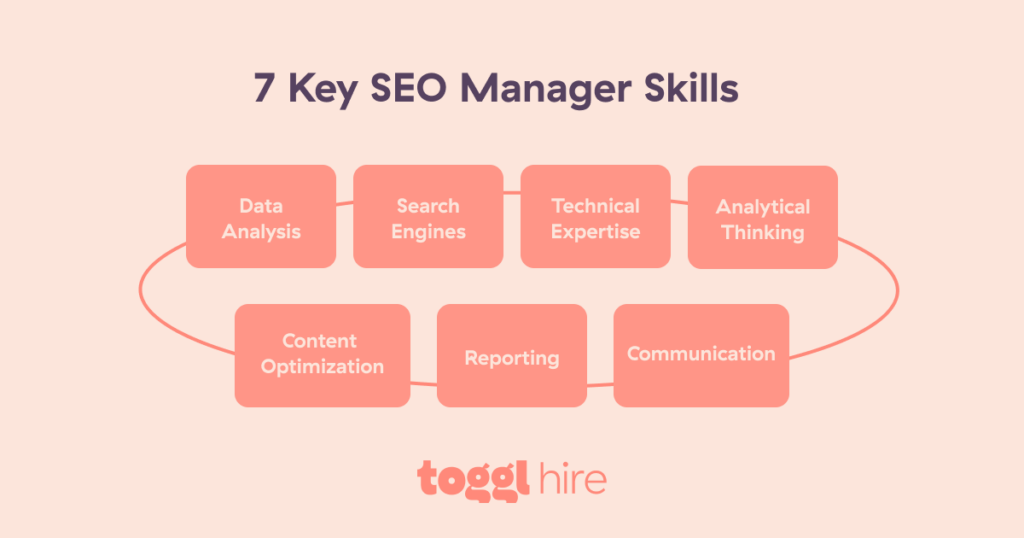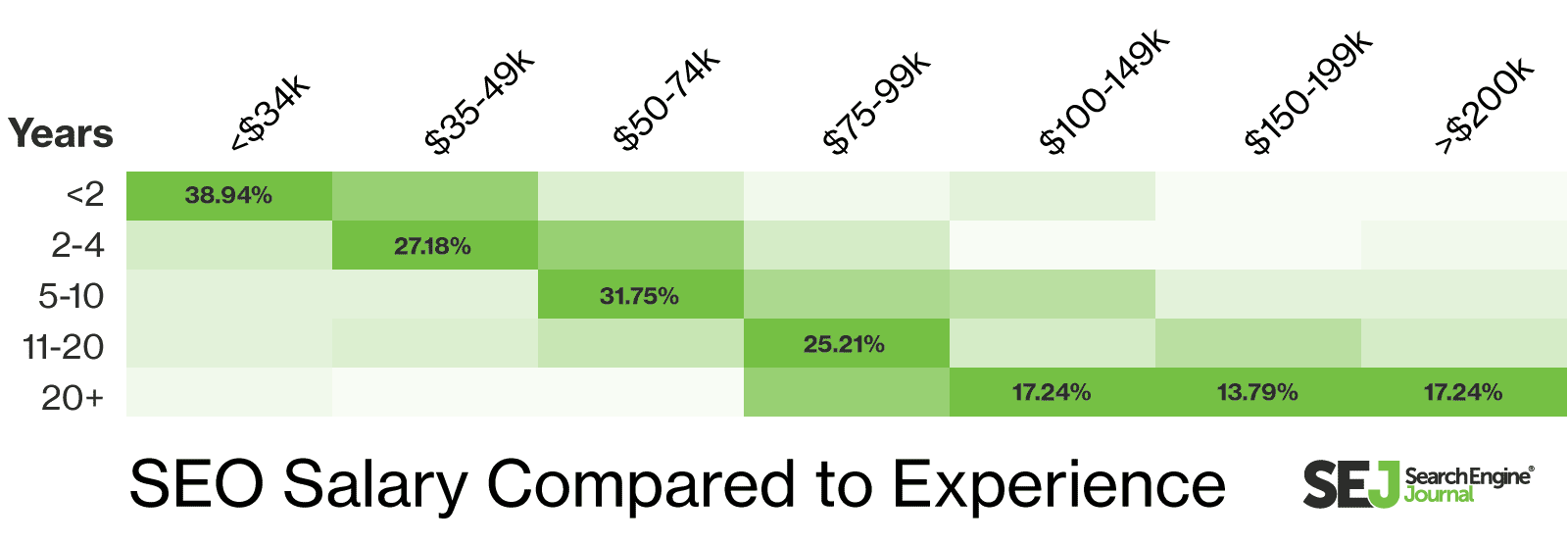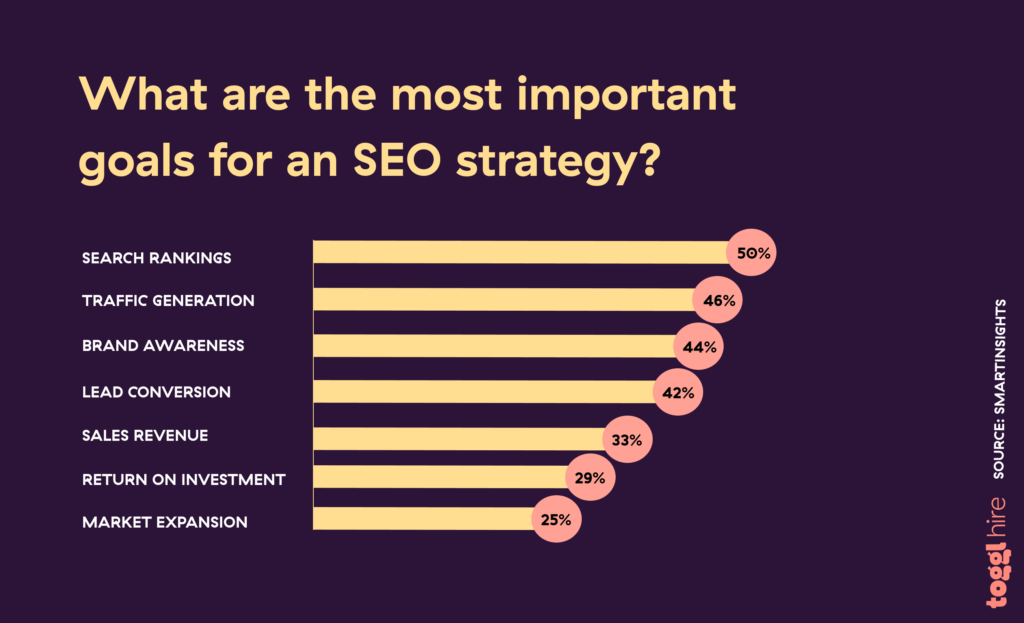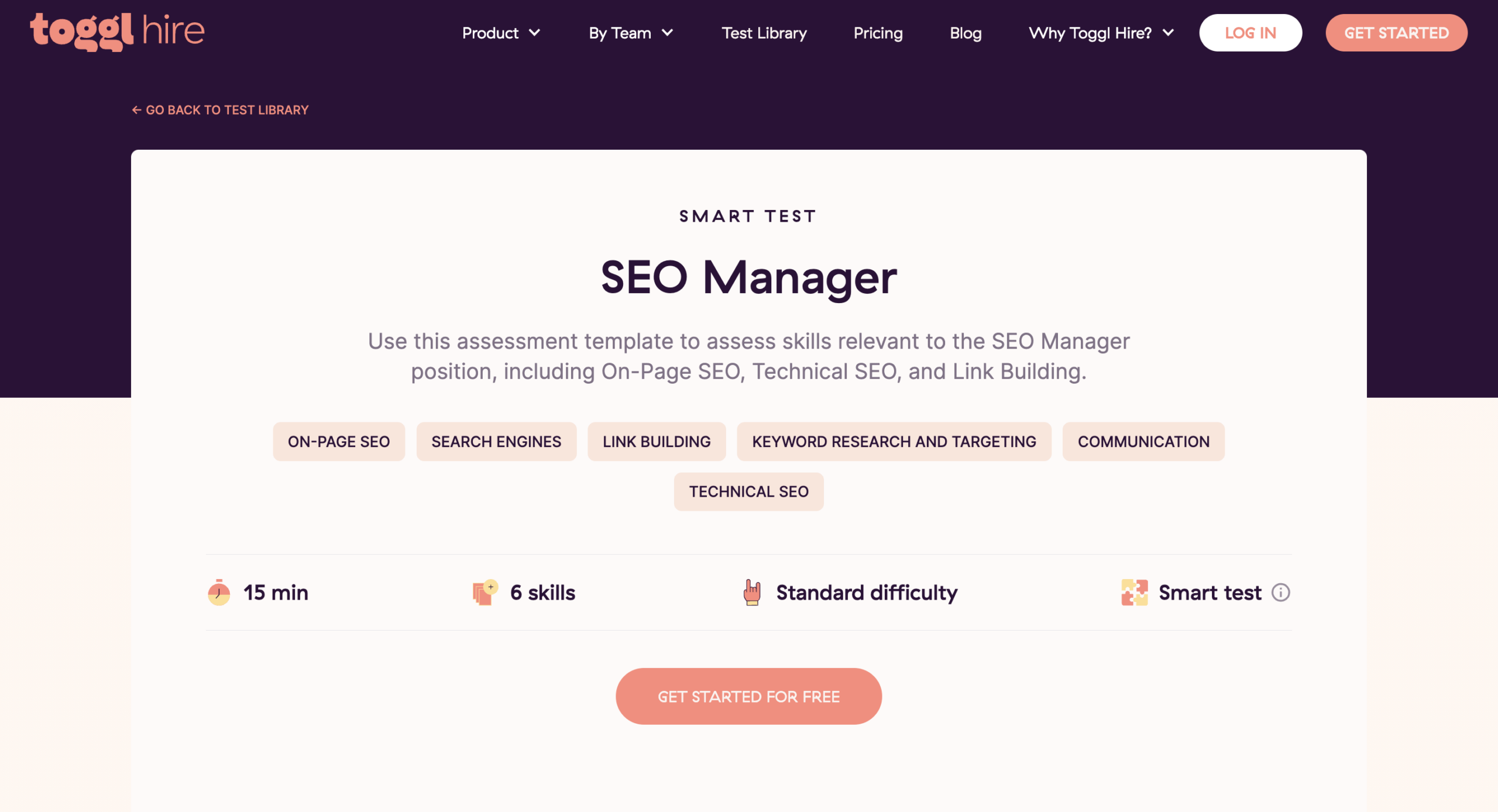Out of all the digital marketing strategies, SEO is known to have one of the best returns on investment and potential for future growth. Unfortunately, it’s also often considered the area with the most “smoke and mirrors,” as it’s hard to tell if someone is good at SEO or just a really good pretender.
Ask any great SEO manager or specialist how long it will take an SEO campaign to start working, and the answer you’ll likely get 99.9% of the time is “It depends.” And that’s because it truly does (especially given recent changes to Google’s algorithm and Search Generative Experiences).
So, how do you even hire an SEO manager? Aside from asking for results (which are just as easy to fake) or references, we’ve got a few tips about how to hire a great SEO professional who actually knows their stuff.
TL;DR — Key Takeaways
- An SEO manager is a marketing expert who develops and implements SEO strategies that help businesses increase traffic to their website and improve their online presence.
- There are different types of SEO roles, including SEO analyst, SEO manager, SEO specialist, and SEO consultant. Depending on your goals and budget, you should choose the best-fitting skillset out of that lot.
- SEO has incredible ROI (yes, even in 2024…), and you should hire an SEO strategist if you have a website and need more revenue from it. However, it’s not the time to make this hire if you don’t have a sizeable SEO budget and are prepared to invest long-term.
- Hiring an SEO manager costs about $80-82k per year in the United States. Salaries drop significantly when hiring in Europe or globally with a remote workforce.
- There are eight steps to hiring a great SEO manager, and it all starts with defining your business goals.
- To hire more effectively for SEO roles, try our SEO manager skills test and cut down your screening time from weeks to hours.

What is an SEO manager?
An SEO manager is a marketing expert who develops and implements SEO strategies that help businesses increase their online presence through their websites.
In other words, they use research, data analysis, content strategy and planning, and on-page and off-page SEO tactics to help websites rank better in search engine results.
Some key skills a good SEO manager should have include:
- Keyword Research: Being able to find keyword opportunities that will help your website rank better
- On-page Website Optimization: Fixing up on-page website elements, such as internal linking, for better rankings
- Content Strategy: Selecting content topics and clusters strategically to increase online presence
- Competitor Analysis: Analyzing competitors’ websites, organic traffic, content, and SEO tactics to guide your own SEO efforts
- Technical SEO: Page speed optimization, schema markups, code changes, and other technical changes
- Off-page SEO Tactics: Link building and outreach, and more
- Detailed SEO Reporting: Being able to create reports on on-page and off-page SEO progress, including items such as new keywords, keyword movements, new traffic and links, and more

SEO analyst, manager, specialist, consultant: Which one should I hire?
SEO itself can be confusing, but SEO job titles can be even more so. Aside from an SEO manager, there are some other roles that need to be mentioned here.
SEO analyst: In charge of gathering, analyzing, and interpreting data related to a website and its search engine performance. It’s more of a technical than a creative role. Best for teams that already have creative talent in-house and need someone with a technical background as an addition.
SEO manager: They’re usually a jack of all trades, versed in on-page and off-page SEO, capable of doing the work themselves and delegating it to a team of professionals, an outsourced agency, or a freelancer. They’re usually best for mid-stage businesses looking to make their first and pivotal SEO hire.
SEO specialist: Hands-on SEO expert in charge of coming up with SEO strategies and implementing them. Similar to SEO manager. Best for mid-stage and larger businesses with a more established marketing team.
SEO consultant: An expert with extensive experience (5+ years) who comes in and suggests strategies, hacks, and quick wins for a business to implement in their SEO and online presence. These types of specialists don’t typically do too much hands-on work but rather delegate it to others. This makes them best for larger enterprise businesses needing an extra set of eyes over their strategy.
Is bringing in an SEO expert worth it?
No matter when you’re reading this post, SEO has the absolute best ROI out of all marketing channels. Even with upcoming changes to Google’s search functions (or especially considering upcoming changes to Google’s search functions, rather), it’s more important than ever to have a qualified SEO expert on your team or consulting with your team.
Shifts towards Google Search Generative Experience will make it more difficult (er, different…) to rank online and drive traffic to websites. Because it’s such a large change that requires in-depth knowledge about current and emerging SEO trends, it’s wise to have a specialist tackle those tasks.
In other words, hiring an SEO professional can make a massive impact on your revenue, especially as the search landscape continues to change in 2024 and beyond.
When you should hire an SEO expert
Wondering if you need to hire an SEO expert for your business and website or whether it’s something your in-house marketing team can tackle? Here are some tell-tale signs you should start the hiring process.
When your website’s traffic is below your expectations and not enough to fuel your marketing/sales growth
When you don’t have an SEO strategy for driving more traffic and increasing leads from search engine results
When you have the budget to afford it
When you need a brand new website built from scratch and optimized properly
When you have an existing team of marketers covering other marketing areas but not a dedicated SEO professional

When you should not hire an SEO expert
In some cases, hiring an SEO expert actually isn’t the smartest decision you can make. Here are those situations:
You don’t have a budget. If you have just a few hundred (or thousand) dollars monthly to spend on SEO, you won’t be very happy with the results if you make a hire. Also, factor in the cost of SEO tools and outsourced services such as link building or content creation.
You don’t have an existing website. It’s best to first build a website and then hire someone for SEO. Alternatively, hire them as a consultant while you’re building the website.
How much should an SEO manager cost?
According to Glassdoor, the typical salary of an SEO manager is just under $80,000 annually, with lower and upper ranges being $79-147,000 per year.
On the other hand, if you look at countries in Europe, the numbers are much lower. The average annual salary for Germany is around $47,000; in France, it hovers around $42,000. The numbers get even lower if you want to hire in developing countries, in Europe, or elsewhere.

If you want to hire an SEO agency or a freelancer, the typical cost will be anywhere from $50-150 per hour. Twenty hours per week at the median price ($100) translates to more than $8,000 monthly. In other words, an in-house hire is more cost-effective.
Then comes the SEO tool stack. At the very least, you’re going to need a keyword research tool (Ahrefs, SEMRush), a scraping tool (Screaming Frog), content writing, and optimization tools (Surfer SEO, Clearscope). You can budget a minimum of $500 monthly on the tools alone.
In short, hiring an SEO expert definitely isn’t cheap, but it can be significantly cheaper if you hire remote candidates. It’s important to consider the growth a great SEO manager can help build, too. Paying an $80k annual salary is a small investment if they can implement strategies that lead to a $200k annual increase in revenue.
Follow these 7 steps to hiring an SEO manager
It can seem challenging to hire an SEO manager, especially if you don’t know SEO yourself. After all, you might be asking the right questions, but if you’re unsure whether their answer about how to build a product-led BOFU content plan is correct or not, how do you know if they’re the right person for the job?
However, hiring an SEO manager who knows their stuff isn’t impossible—if you prepare and do your research beforehand. We’ve recently hired an SEO-focused content manager, and here are the practical steps you can use to hire an SEO manager fairly easily.
1. Define your business goals and audience
There is a lot that SEO can do for your business and website. Before setting out to find someone for SEO services, determine precisely what you want to achieve. “Getting more traffic” and “outranking my competition” are not actionable goals.
Instead, think of the following:
Increasing organic traffic by 20% month-over-month
Ranking in the top 10 for our most relevant keywords
Creating a content strategy for the upcoming quarter and creating new bottom-of-the-funnel content
Improving your page load speed and technical SEO to get more out of your existing site
These are all good starting points, so consider the most important challenges you want to solve with SEO. If you’re at a loss for where to start, look at these common SEO goals companies set:

2. Consider the SEO skills you need
Once you do some research of your own, you’ll start realizing that search engine optimization is an enormous branch of digital marketing. As such, there are many skills that your ideal SEO expert could have, such as:
- Technical SEO
- Content strategy
- Content creation
- Off-page SEO (link building)
- Paid ads
- Conversion rate optimization (CRO)
- Basic programming skills
- Search engine knowledge
Don’t just look at your current needs. Search engines constantly change their algorithms, and your company’s needs will change, too. When you want to hire SEO experts, try to assess your future SEO needs a year or more from publishing your job ad.
3. Define your budget
Depending on how much money you have for SEO services, there are three paths you can take:
- Hiring an in-house SEO expert
- Hiring an SEO agency
- Hiring a freelancer/SEO consultant
Each comes at a different cost, with in-house being arguably the most expensive choice out of the three.
If you can spare a few thousand dollars of investment for SEO campaigns per month (and nothing more), you might be better off with SEO companies or a freelancer. On the other hand, if you have a sizable marketing budget and an existing team of people covering different areas of marketing, you can start thinking about hiring in-house.
4. Local or remote?
As a company with a fully remote team, we’re highly biased in favor of hiring remotely. This is a consideration you must make, as it will impact many other hiring factors, especially the salary or rate.
Locally, finding an SEO expert with relevant experience can be hard. If you do, they might already be employed, or they could be quite expensive to hire.
When expanding your search globally and remotely, you can hire SEO experts from all around the globe. And since you’re not tied to your local market and wages, you can snag SEO experts from another part of the world for a fraction of the cost it would take to hire locally.
5. Create a good SEO specialist job description
Just like developers can see through poorly written job descriptions done by non-developer folk, so can SEO professionals. Creating the right job description will be immensely helpful in attracting the right kind of talent to your job ad.
Here is a checklist to go through:
- Have a clear idea of your business goals and job requirements
- Make sure your goals are realistic (e.g., you can’t expect a 100% traffic increase in one month)
- Look at other search engine optimization job ads to get inspired in terms of common responsibilities
- Be realistic about the required experience and skill set – one SEO consultant cannot be an expert in all fields of SEO
- List the salary or wage and ensure that it is in line with the rates in your area, industry, and the required experience
🔥 Wondering where to start? Look at examples of SEO manager job ads and descriptions online to see how others are attracting top candidates.

6. Pre-screen your candidates using a skills test
It’s admittedly pretty hard to prove your SEO skills if you’re an SEO expert, so why not make it easier for your applicants and yourself? Instead of waiting until the interview, use an SEO skills test to pre-screen your SEO expert at the very start of the hiring process.
When candidates do the test, you’ll immediately know if they possess practical skills, such as keyword research, on-page optimization, or link building, and other SEO knowledge.
What’s even better is that they will immediately know if they’re a good fit for you, as they will see their score instantly after taking the test.
No need to reinvent the wheel! Customize one of our skills assessment templates and get testing in no time.

7. Ask the right SEO interview questions
Depending on your questions, candidates can immediately tell whether you’re the kind of client or business they want to work for. Much like the job description, this part needs detailed research and preparation, especially if you have no previous SEO experience. Here is where to start:
How do you stay current with SEO trends?
As all SEO experts know, algorithms change pretty much every month these days, and something that works today might not work a few months later.
Ask your potential candidates about the sources they learn from and how they stay on top of the latest SEO trends. You’ll want to hear names such as Search Engine Journal, Google Blog, Backlinko, Search Engine Land, SEMRush, MOZ blog, etc.
What tools do you use?
Top SEO experts have a dedicated tool stack they trust, and answering this kind of question should be pretty easy for the right candidate. You’ll want to learn their tools for keyword research, content optimization, SEO audits, off-page SEO research, and more.
Tools you should expect to be mentioned: SEMRush, Ahrefs, Screaming Frog, MOZ, SurferSEO, Google Search Console, Google Analytics, SimilarWeb, Exploding Topics, and others.
What metrics do you look at to measure progress?
It will be really easy to identify true SEO experts once they answer this question. You’re looking for an answer that shows the results of their previous work. They must be specific and to the point and avoid beating around the bush. Some examples of answers you can look for:
- Increase in organic traffic
- Increase in keywords the website is ranking for
- Improvements in keyword rankings for the most important keywords for the business
- Increase in page load speed for the website
- Increase in conversions from organic traffic

These are excellent starting points, and SEO experts worth their salt should be highly specific about the SEO strategies used and the results they achieved.
Walk me through the SEO problems that you see on our website.
There is no better way to hire SEO professionals than asking them to show rather than tell.
Give your job candidates a task to tell you what makes search engines love (or hate) your website—and what they would improve. Most search engine optimization experts won’t take more than a few minutes to give you basic suggestions on what to improve and fix.
Using a case study from a past client as an example, explain the steps involved in creating an SEO strategy.
To explain their thinking and typical search engine optimization process, ask job candidates to walk you through a case study from a previous client. While they won’t be able to give you all the details, they should give you the main details around setting up a campaign, doing an audit, identifying quick wins, etc.
What are your strengths and weaknesses when it comes to SEO skills?
The idea is to figure out which skills the candidate has and which they are lacking. No SEO has it all, so you want someone realistic with a good grip on their skills and knowledge. They should be able to answer this honestly and explain their weaknesses.
Bonus: Other ways to test an SEO candidate’s skills and experience
If only it were as easy as asking the right questions! Whether you’re using skills tests to gauge technical skills or not, here are a few other ways to hire an SEO manager with the skills you need to boost your website’s organic visibility and other important metrics.
Request a list of case studies and references
The ideal candidate should be able to show what they achieved in their previous roles and back it up with data. Ideally, they should provide references and testimonials to support these results.
Request an SEO audit
This one is a bit tricky since it requires paid tools, but most candidates should be able to pull it off without much hassle. A free, high-level SEO audit will not take the potential search engine optimization expert more than an hour, and it should give you a sample of their skills.
Sometimes, a potential SEO hire will be as keen on doing an SEO audit before coming on board as you are. For the best results, we recommend paying the potential candidate for their work and time spent deep-diving into your website performance. This way, you can observe their work ethic, communication skills, ability to work in a team and stick to deadlines. It’s a win-win for everyone!
Set up a panel of peer review with the final candidates
Invite the top SEO experts you want to hire in front of a panel in your company (separately, of course, but use the same panel for consistency). This will give different people a chance to ask key questions about their experience with search engines and get insights on how the new hire can contribute to the overall strategy.
Learn more about running effective peer interviews to avoid unconscious bias!
Keep everyone in the loop throughout the hiring process and offer feedback
Tell candidates why they didn’t make it to the next hiring round and, when you can, offer personalized feedback. If someone does not make it further, ensure they know it sooner rather than later.
Negotiate the salary and the benefits package
The ranges for SEO manager salaries can get wild. Keep your finger on the pulse in your job market and offer a competitive salary that will make both sides happy. It’s advisable to list the salary early on in the job ad if you want to hire SEO experts who meet your requirements and expectations.
Kickstart your search for an SEO manager with Toggl Hire
Ready to hire SEO experts today? We can help! With Toggl Hire’s SEO manager test, you can ask all the right questions at the very start of the hiring process. The best part is…you don’t even need any SEO knowledge yourself!
Our SEO manager test allows you to screen automatically and find top talent in hours rather than weeks. Just follow these three rules:
- Set your test threshold high (+80%)
- Personalize the test (with data about your business and questions related to the actual role)
- Ask for feedback at the end of the test (so you can refine your hiring efforts)
And that’s it! Happy hiring!
Juste loves investigating through writing. A copywriter by trade, she spent the last ten years in startups, telling stories and building marketing teams. She works at Toggl Hire and writes about how businesses can recruit really great people.










